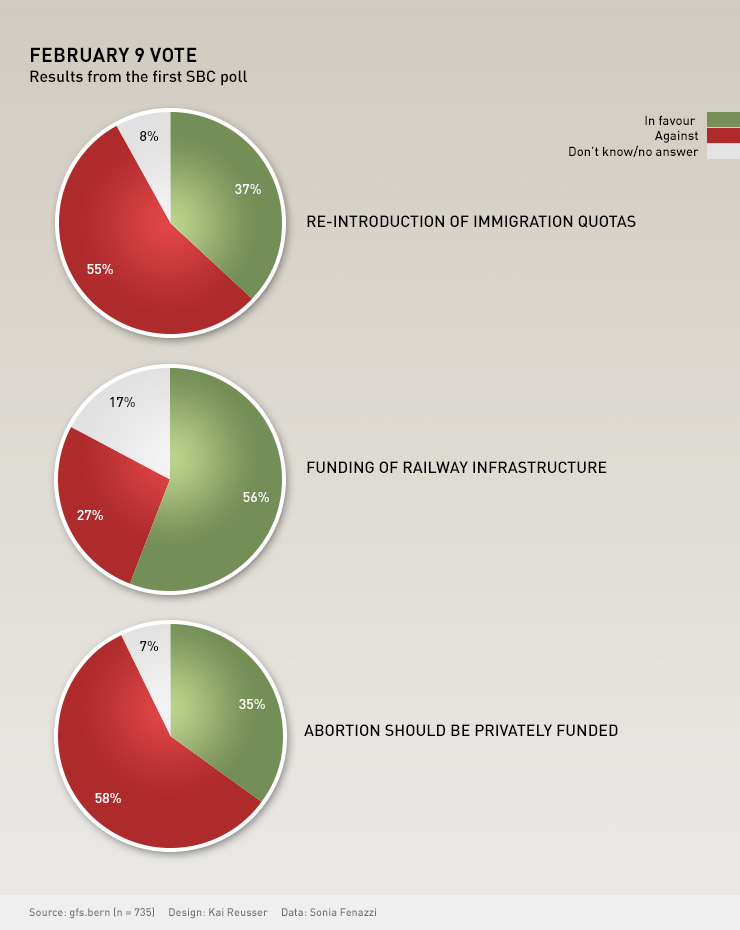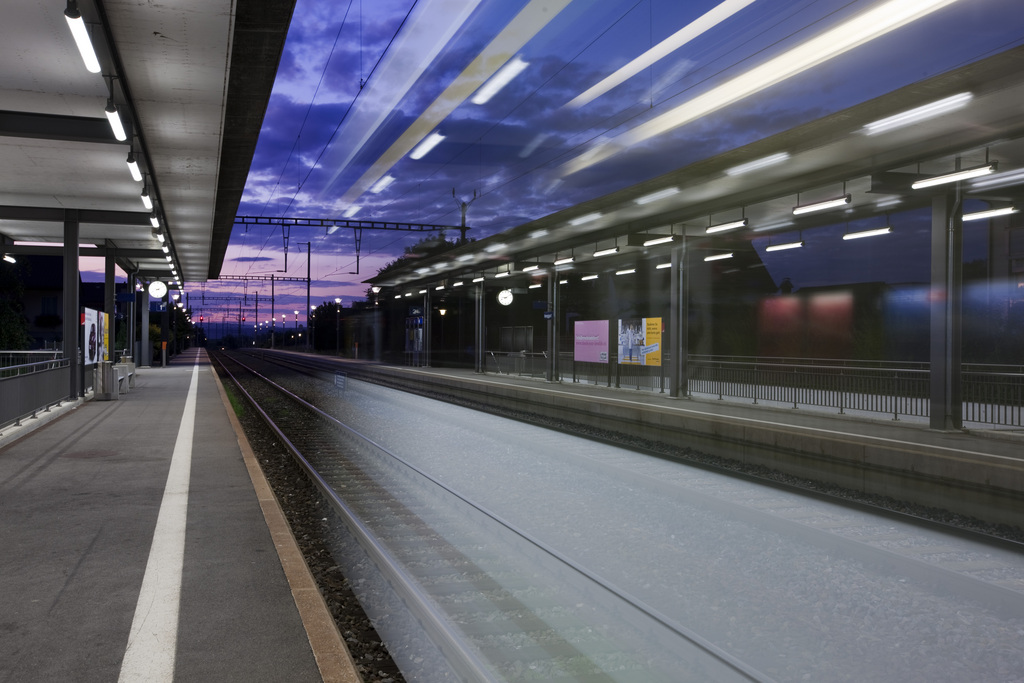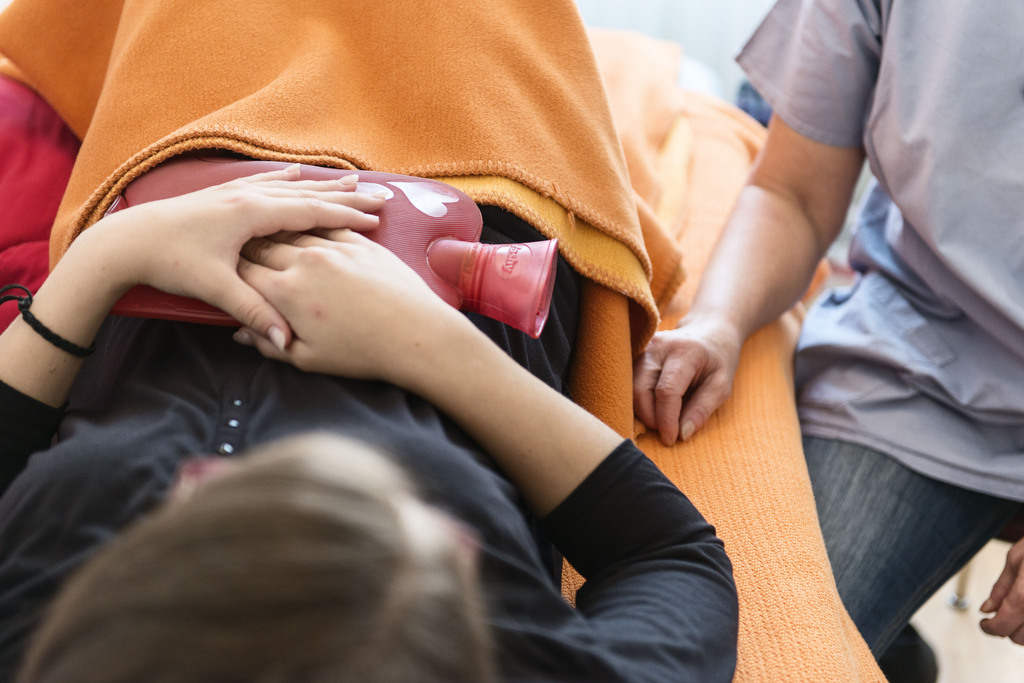Turnout could decide immigration vote

A proposal to re-introduce immigration quotas would fail to win a majority at the ballot box next month, according to an early poll. But pollsters say a high turnout of citizens could still swing the outcome.
Supporters of the initiative by the rightwing Swiss People’s Party lagged 18 percentage points behind in an opinion poll published by the Swiss Broadcasting Corporation on Friday.
They held a 37% minority share six weeks ahead of the vote on February 9. (See graphic)
However, Claude Longchamp, head of the leading GfS Bern polling and research institute, says all is not lost for the promoters of the initiative.
“The survey shows that they have succeeded in spreading concerns about a negative impact of the free movement accord and the advantage of a re-introduction of immigration quotas,” he says.

More
SBC poll
Longchamp sees a great potential for the People’s Party to win over important minorities among the grassroots of other parties, notably members of the middle class and citizens in the Italian-speaking part of the country, who fear competition from foreign labour in their workplaces and by a perceived shortage in affordable accommodation in urban areas.
The political scientist also notes that issues over unemployment and immigration have become a priority in the institute’s annual ‘worry barometers’.
He warns not to underestimate the impact of the political campaigns on voters in the run-up to the February ballot.
It is estimated that both sides will spend about CHF5 million ($5.5 million) on their campaigns.
Researchers say 41% of respondents in the poll said they would take part in the vote.
The pollsters interviewed 1,207 Swiss citizens from across the country for the first of two nationwide surveys ahead of the February 9 vote.
Swiss expatriates are not included in the poll.
The telephone interviews took place between December 23 to January 3.
The margin of error is 2.9%.
The survey was commissioned by the Swiss Broadcasting Corporation (SBC), swissinfo’s parent company, and carried out by the leading GfS Bern research and polling institute.
Risks
Opponents of the initiative – the government, the business community and most political parties – have to make a special effort, according to Longchamp. Otherwise they risk losing the vote.
A united front of opponents has argued approval of the initiative would undermine Switzerland’s prosperity and the competitive edge of its economy with the European Union, its main export market.
A set of bilateral agreements, notably regulating free access to each other’s labour markets, could be in jeopardy, they warn.
The quota system was gradually abolished by 2008, following a first vote at the turn of the millennium. The proposed new system would also include numbers of asylum seekers.
Abortion
A separate controversial initiative before voters is a proposal by a committee of conservatives to end the funding of abortions under the mandatory health insurance scheme.
The proponents, backed by the People’s Party, say it is not justified to call on the general public to help finance the termination of pregnancies. However, their opponents have a lead of more than 20% in the latest opinion poll.
“Things appear clear from the outset of the campaign. We can assume that opponents will gain additional ground,” says GfS Bern political scientist Martina Imfeld.
Abortion was legalised in Switzerland following a nationwide vote in 2002.
Railway infrastructure
The third vote issue, a constitutional amendment to set up a financing scheme for the country’s railway infrastructure, currently has a majority of 56%, but a further 17% of respondents are still undecided.
The People’s Party as main opponent of the parliamentary move says the system is an unjustified financial burden for the road transport industry and people who commute to work by car.
Last November, voters in a nationwide ballot rejected a plan by parliament to increase the annual motorway fee.
Voters decide on three separate issues:
An initiative by the rightwing Swiss People’s Party for the re-introduction of annual immigration quotas, including asylum seekers.
A proposal by a group of conservatives to take abortions off the list of medical treatments covered by the mandatory health insurance.
A constitutional amendment defining the financing of railway infrastructure projects.
It is the first of up to four sets of nationwide ballots this year.
At the same time, elections and votes on a variety of issues take place at cantonal and local level.

In compliance with the JTI standards
More: SWI swissinfo.ch certified by the Journalism Trust Initiative













You can find an overview of ongoing debates with our journalists here . Please join us!
If you want to start a conversation about a topic raised in this article or want to report factual errors, email us at english@swissinfo.ch.